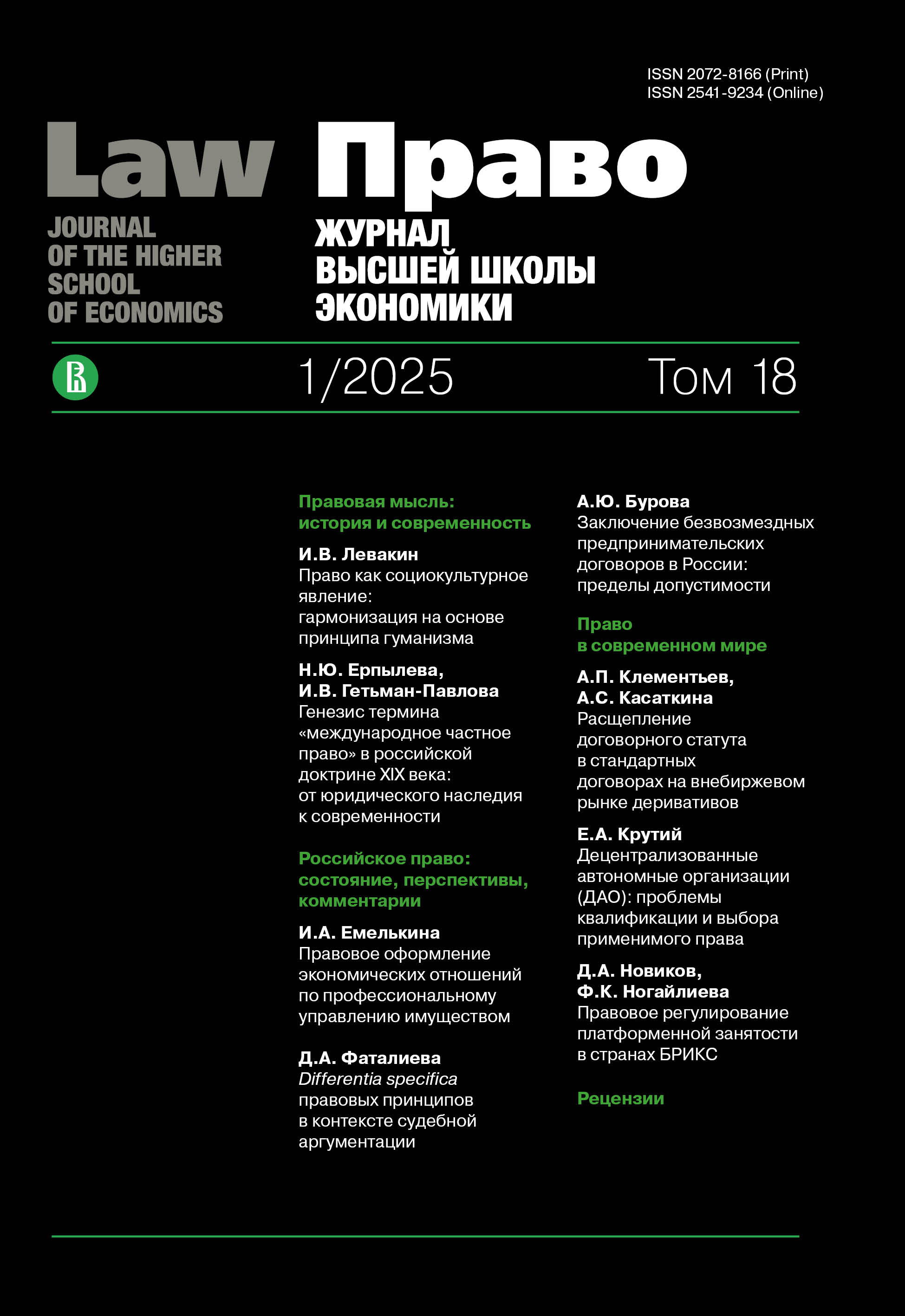Децентрализованные автономные организации (ДАО): проблемы квалификации и выбора применимого права
Аннотация
Децентрализованные автономные организации (ДАО) получают все большую популярность в интернет-пространстве, а с ней — и признание в правовых системах различных государств. Данный процесс связан прежде всего с развитием криптоиндустрии, легализацией майнинга, в том числе в России. Майнинг может осуществляться субъектами как самостоятельно, так и путем объединения в майнинг-пулы, имеющие сходную с ДАО природу. Отличительной чертой данных организаций является децентрализованный характер процессов управления и функционирования, в которые оказываются вовлечены практически все участники сетевого сообщества. Деятельность ДАО носит трансграничный характер, что позволяет рассматривать ее в качестве специфического участника международных частных правоотношений. Данное правовое явление требует отдельного изучения таких проблем в МЧП, как квалификация ДАО и разрешение предварительного коллизионного вопроса, а также формулирование основных подходов к выбору применимого права. В статье на основе сравнительно-правового и формально-юридического методов выделены и рассмотрены квалифицирующие признаки ДАО: цифровая форма корпоративных правоотношений, децентрализованность, автономность, конфиденциальность и подчиненность lex cryptographica. Оптимальным решением предварительного коллизионного вопроса признается квалификация ДАО по праву страны, в которой она была создана. Если место учреждения ДАО установить невозможно, допускается ее квалификация по праву суда. Выбор компетентного права ставится в зависимость от вида ДАО. В отношении цифровых юридических лиц и юридически оформленных элементов гибридной ДАО будут применяться традиционные коллизионно-правовые принципы. Правом, применимым к «чистой» ДАО, предлагается считать право, регулирующее лежащее в основе сетевого сообщества соглашение между его участниками. В свете указанных подходов предпринята попытка определить правовой статус ДАО и их коллизионно-правовое регулирование с точки зрения российского международного частного права. ДАО соотносится с такими известными нашему праву корпоративными формами, как простое товарищество, общественная организация без образования юридического лица и гражданско-правовое сообщество.
Литература
Akimova Yu.M. (2015) Principles of international private law. Candidate of Juridical Sciences Thesis. Moscow, 210 p. (in Russ.)
Ayusheeva I.Z. (2020) Civilian law entities within economy of common consumption. Aktual'nye problémy rossijskogo prava=Issues of Russian Law, vol. 15, no. 6, pp. 95-104 (in Russ.) DOI: https://doi.org/10.17803/1994-1471.2020.115.6.095-104
Binetti V.M. (2023) Decentralized autonomous organizations (DAOs): evolution, taxonomy and legal challenges. Roma: Link Campus University, 95 p. DOI: https://doi.org/10.2139/ssrn.4848308
De Filippi P., Wright A. (2018) Blockchain and the law: the rule of code. Cambridge: Harvard University Press, 312 p. DOI: https://doi.org/10.4159/9780674985933
Erpyleva N.Yu., Get'man-Pavlova I.V. (2007) International private law. Praktikum. Moscow: Eksmo, 768 p. (in Russ.)
Get'man-Pavlova I.V. (2024) International private law. Vol. 1. General part. Moscow: Yurait, 320 p. (in Russ.)
Guillaume F. (2023) Decentralized Autonomous Organizations (DAOs) in front of courts. How can private international law keep up with global digital entities? In: A. Perestrelo de Oliveira, A. Garcia (eds.) DAOs Regulation: Principles and Perspectives for the Future. Tübingen: Mohr Siebeck, pp. 135-168. DOI: https://doi.org/10.2139/ssrn.4492934
Guillaume F., Riva S. (2023) Blockchain dispute resolution for DAOs: the rise of decentralized autonomous justice. In: A. Bonomi et al. (eds.) Blockchain and Private International Law. Leiden: Brill/Nijhoff, pp. 549-641. DOI: https://doi.org/10.1163/9789004514850_022
Hassan S., De Filippi P. (2021) Decentralized Autonomous Organizations. Internet Policy Review, vol. 10, issue 2, pp. 1-10. DOI: https://doi.org/10.14763/2021.2.1556
Hassan S., De Filippi P. (2017) The expansion of algorithmic governance: from code is law to law is code. Field Actions Science Reports: The Journal of Field Actions, no. 17, pp. 88-90. Available at: https://ssrn.com/abstract=3117630
Kasatkina A.S. (2016) The Hague Convention on law applied to trusts and its recognition. Zhurnal zarubezhnogo zakonodatel'stva i sravnitel'nogo pravovedeniya=Journal of Foreign Legislation and Comparative Jurisprudence, no. 5, pp. 44-48 (in Russ.)
Kondrat'eva E.M. (2019) Trust as classic example of mechanism of tax and hereditary planning. Zakonnost' i pravoporyadok=Legality and Rule of Law, no. 4, pp. 44-50 (in Russ.)
Kondyrev V.A. (2018) DAOs: new way to decision-making. Cifrovaya ekonomika=Digital Economy, no. 2, pp. 23-30 (in Russ.)
Mazhorina M.V. (2019) Collision of law and non-law, renovation of lex mercatoria, smart-contracts, and blockchain arbitration. Lex Russica, no. 7, pp. 93-107 (in Russ.) DOI: https://doi.org/10.17803/1729-5920.2019.152.7.093-107
Riva S. (2019/2020) DAOs in the Swiss legal order. Yearbook of Private International Law, vol. 21, pp. 601-638. DOI: https://doi.org/10.9785/9783504386962-028
Sidorenko E.L. (2024) DAOs in a system of modern law. Lex Russica, vol. 77, no. 1, pp. 119-132 (in Russ.) DOI: https://doi.org/10.17803/1729-5920.2024.206.1.119-132
Sojfer T.V. (2018) Non-commercial bodies: aspects of civilian legal personality. Zhurnal rossjskogo prava=Journal of Russian Law, no. 1, pp. 30-39 (in Russ.)
Copyright (c) 2025 Крутий Е.А.

Это произведение доступно по лицензии Creative Commons «Attribution-ShareAlike» («Атрибуция — На тех же условиях») 4.0 Всемирная.


















